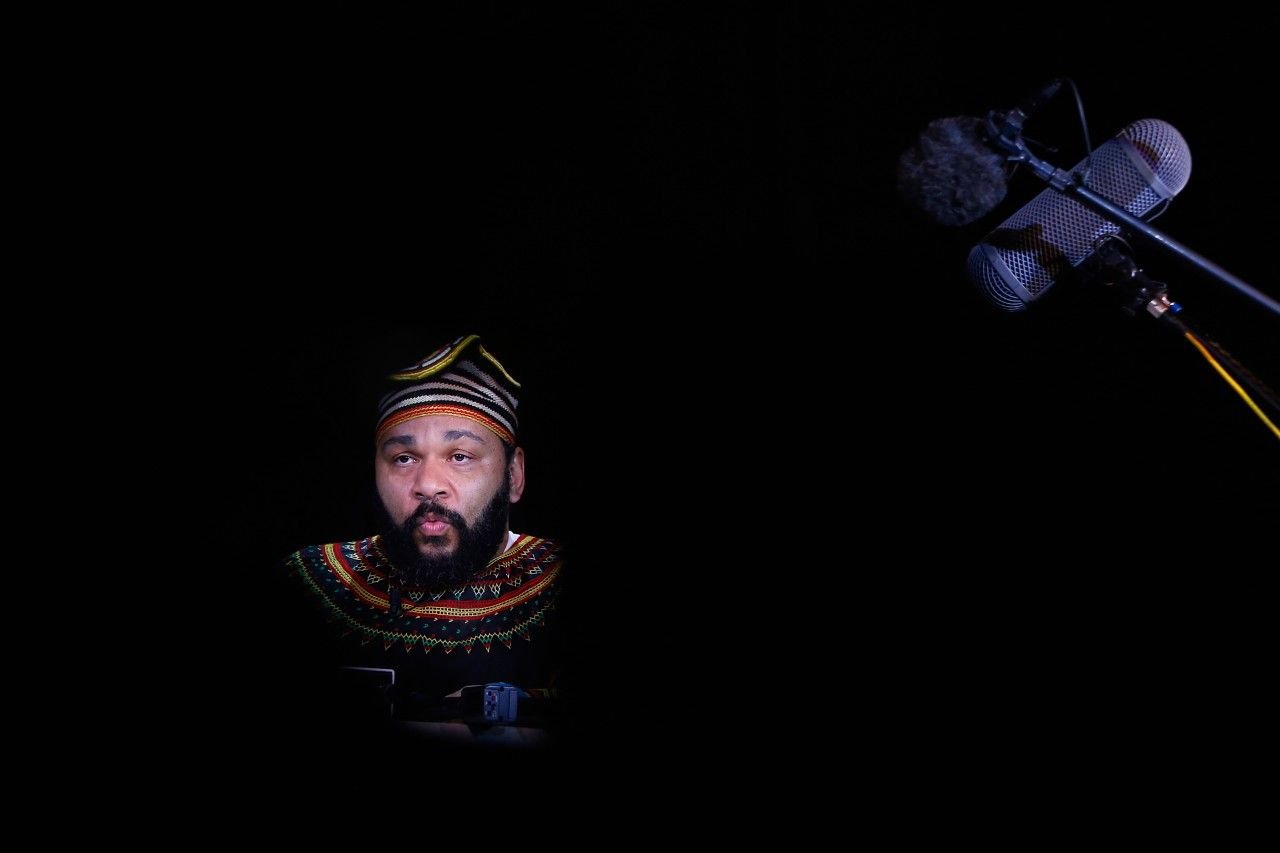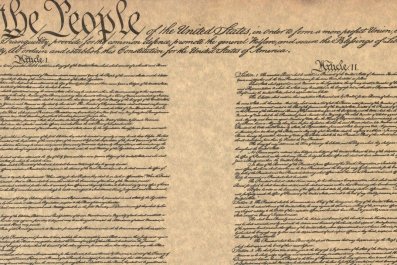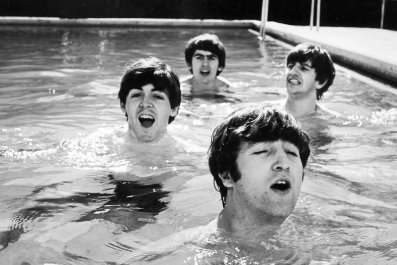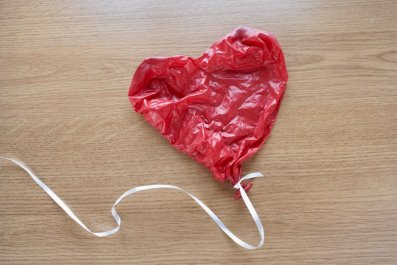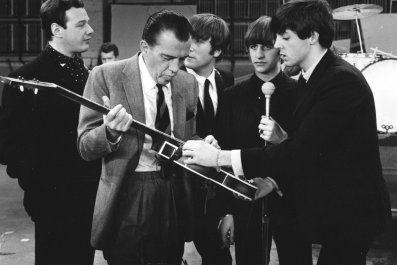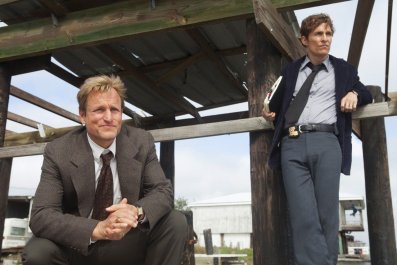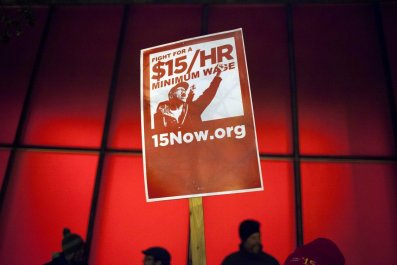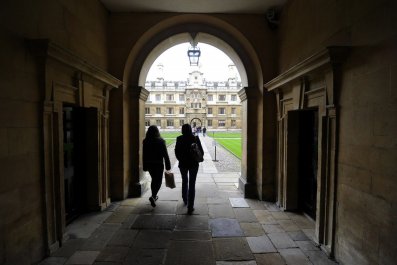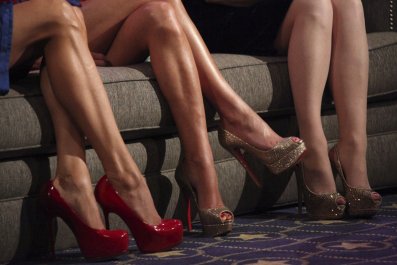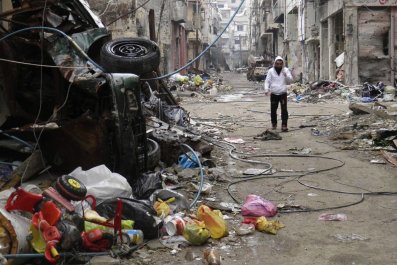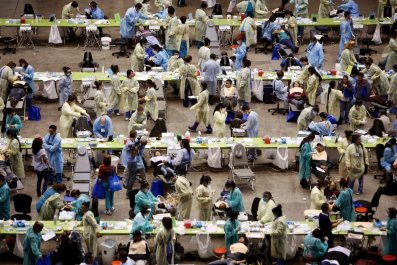Here in France, une quenelle is a sausage-shaped dumpling made of creamed fish, chicken or some other meat. At least, it was until the comic, actor, polemicist and sometime candidate for political office Dieudonné M'Bala M'Bala appropriated it.
His version sprang from a vulgar joke about a dolphin's fin in a sketch he performed a decade ago, during which he touched his shoulder with one hand while holding the palm of the other hand outstretched toward the ground.
Next, he talked about the "promised land" - a reference to Israel - saying it made him vomit. The comic's father was from Africa and Dieudonné is angry that France paid reparations to Jewish families after World War II but paid nothing to the families of black slaves.
The gesture and the Israel jibe may not have been linked at the outset. But, they are now. Dieudonné incorporated it into his act and said he would like to shove a quenelle up the backside of Zionists.
He invited a notorious Holocaust denier on stage and appeared on a TV chat show dressed as an Orthodox Jewish rabbi, giving a Nazi salute while shouting "Isra-heil!"
He employed the quenelle in an anti-Zionist campaign when standing in the European elections of 2009 as head of an "anti-communitarist and anti-Zionist" party.
To those who believe the world is controlled by Jews - more than a few in France - he is a hero.
Critics say Dieudonné's quenelle is a disguised Nazi salute. He claims the gesture is neither a covert "Sieg Heil!" nor anti-Semitic but anti-establishment, a French equivalent of the rigid middle finger, meaning "up yours."
Photos posted online tell a different story. They picture people, some grinning, some masked, giving the salute outside synagogues, Holocaust memorials, kosher restaurants, Jewish schools and retirement homes, beneath street signs such as rue des Juifs, next to railway wagons used to deport Jews from France during World War II and at Auschwitz-Birkenau, where over a million were killed.
Among those performing the quenelle are women in Muslim veils and Jean-Marie Le Pen, the founder of the xenophobic, right-wing Front National party, who is godfather to one of Dieudonné's children. Strange bedfellows.
But, it's about more than poor taste. Dieudonné's antics and his popularity - his online videos attract millions of hits - are a symptom of an alarming surge in anti-Semitism in France.
A 2012 poll by the U.S. Anti-Defamation League, which has tracked attitudes to Jews in France, reported that the overall level of anti-Semitism increased to 24 percent of the population, up from 20 percent in a previous poll just four years before.
The league also found that 35 percent of French people believe that "Jews have too much power in the business world," while 35 percent believe "Jews still talk too much about what happened to them during the Holocaust."
Some commentators say France's Jewish community - at around 500,000, the largest in Europe - has no future. One Paris rabbi is quoted as saying 80 percent of young couples about to marry tell him this. A November 2013 survey for the European Union Agency for Fundamental Rights found 46 percent of French Jews questioned were contemplating emigration.
More on that later. The latest row over Dieudonné began in December when a concealed video camera smuggled into le Théâtre de la Main d'Or (the Golden Hand theatre), the 250-seat Paris theatre he rents near La Place de la Bastille, captured him lampooning a Jewish TV presenter: "When I hear him talking, I say to myself: Patrick Cohen, hmm... the gas chambers... what a shame."
In January, this triggered a chorus of condemnation from President François Hollande, government ministers and city mayors, with demands that Dieudonné be forbidden from performing. Since then, his one-man show - The Wall - has been banned by different authorities. Policemen, firefighters, members of the armed forces and professional footballers have been reprimanded for using the quenelle.
As columnists worried about freedom of speech and Dieudonné's celebrity, Hollande's government declared a victory. Nevertheless, by mid-January the funnyman was back on stage with a new show. There were fewer Jew jokes; no mention of gas chambers, how a Nazi concentration camp number tattooed on your arm opens doors, or that his "favorite president" was Philippe Pétain, the puppet ruler who collaborated with the Nazis in World War II.
The Jewish French Students Union, which successfully sued Twitter to disclose the source of its anti-Semitic tweets, says the live performances are secondary to Dieudonné's social media presence, which has soared since the attempts to silence him. "It is hard for French law to control online hate videos," Sacha Reingewirtz, the union's president told Newsweek.
It is hard to completely identify Dieudonné's audience, though it reaches far beyond the traditional suspects of anti-Jewish French Arabs and old-school anti-Semites. A November European Union survey of Jews across eight countries on their experiences and perception of anti-Semitism found French Jews attribute the rise in anti-Semitism as follows: Muslim extremists 73 percent; left-wing activists 67 percent; the far right 27 percent.
His audiences include those from "respectable" occupations, such as academics and intellectuals, journalists and teachers. Tickets to his shows cost $60, which is too high a price for the suburban unemployed thought to be the core of anti-Semitism. Members of the Jewish students union who traveled to Nantes to protest against Dieudonné's remarks were greeted by young yobs, both white and Arab, shouting, "Dirty Jews!"
Just as telling, perhaps, is the French reaction to the Dieudonné affair. A poll in late January by Brulé Ville et Associé found that while most had a negative opinion of the comic, 52 percent disapproved of the ban on his anti-Semitic act and 74 percent thought the government had made too much of the affair. Meanwhile, the British government has declared the comic persona non grata and says he will be turned back at the frontier if he tries to enter the country.
Also, Dieudonné, 47 years old, owes $88,311 in unpaid fines relating to anti-Semitism: seven convictions for inciting racial hatred. The finance ministry is looking into allegations he shifted money abroad to avoid paying the fines; perhaps more than $546,600 to Cameroon, his father's country of origin.
His mother is Breton, from western France. Dieudonné owns nothing himself. His businesses are registered in the names of family members. Allegedly, he has not paid taxes for 15 years and owes almost $1,217,000. He is accused of tax evasion, money laundering and organizing his own bankruptcy.
How has he stayed out of prison? A Jewish community leader who said he'd asked senior judges the same question, notes, "They said he has very good legal advice."
It looks like he'll need it. At the end of January, police investigators who searched his properties found almost $877,000 and $15,000 in cash, according to a source close to the inquiry. Meanwhile, the Paris prosecutor's office is looking into the comic's appeal on the Internet for donations to pay his fines. Such an appeal is illegal and punishable by up to six months' imprisonment and a fine of up to $61,000.
With 70 percent of French people disagreeing with government actions against Dieudonné, is l'affaire Dieudonné a French farce. Or, does it show that the French are anti-Semitic?
In the European Union survey, two thirds of the respondents thought discrimination and hate crimes against Jews in the European Union countries was a problem. Three quarters said anti-Semitism had increased where they live over the past five years. Along with Hungary and Sweden, France scores badly, and its Jewish community suffers the greatest anxiety.
Part of the problem is that France has what the police call "previous form" in its treatment of Jews.
More than a century after it unfolded, the Dreyfus affair - the case of a French Jewish Army officer falsely convicted of spying for Germany - is still discussed. Alfred Dreyfus, a captain in the artillery, was court-martialed, found guilty of treason and sent to Devil's Island, a penal colony in French Guiana, before being exonerated with the help of, among others, the writer Emile Zola.
The scandal divided France and exposed deep-rooted, widely held anti-Semitism. In spite of Dreyfus, many Jews believed they'd assimilated into French society. They were mistaken.
A short walk from Notre Dame Cathedral, in the Marais, the old Jewish quarter of Paris, is "the Wall of Names." Six walls, in fact, in the courtyard of the Memorial of the Shoah - shoah is a Hebrew word that translates as "catastrophe" but is usually rendered in English as "the Holocaust."
Engraved on marble are the names of 76,000 Jews, including 11,000 children, deported from France between 1942 and 1944 with the collaboration of the Vichy French government as part of the Nazi plan to exterminate the Jews of Europe. Most were murdered in the Auschwitz-Birkenau concentration camp in Nazi-occupied Poland. Only 2,500 survived.
One of the few to have been prosecuted for crimes against humanity was Klaus Barbie, a Nazi SS Captain, known as "the butcher of Lyon," who was extradited from Bolivia for trial in France in 1987. His trial revived memories France prefers to forget. Barbie ran the Gestapo in the city from 1942 to 1944 and was responsible for the deaths of 14,000 and the torture of men, women and children.
Much of the testimony at his trial was distressing, not the least being accounts of French collaboration and betrayal of resistance fighters, including resistance leader Jean Moulin. Barbie was convicted and died in prison four years later. Not a moment too soon for many in France. Before and after the trial, successive French administrations denied responsibility of the Vichy government's involvement, arguing that it was an illegal regime.
The wall was unveiled in 2005, 60 years after the liberation of Auschwitz-Birkenau. Inside the Shoah museum, a wall plaque carries a pointed reminder that "after years of amnesia, France finally acknowledged the responsibility of the Vichy government in 1995." The wall's message is let's forgive but not forget.
Evidently, some people didn't get it. Since the Wall of Names was created, French Jews have suffered more verbal and physical violence than at any time since the end of World War II. The Jewish Community Protection Service says more than half the racist attacks in France are against Jews - and they have become more frequent. In 2012, there were 614 attacks; 389 the year before.
Among the incidents: a Jewish DJ brutally murdered in Paris, apparently by a Muslim youth organization. A Jewish school bus set on fire in Strasbourg. A concert by an Israeli singer interrupted by shouts of "death to the Jews." A 14-year-old boy wearing a kippa beaten near a Paris Metro station, with bystanders declining to intervene. A 12-year-old Jewish school girl beaten by two men who carved a swastika into her face with a box cutter. Synagogues torched, cemeteries desecrated, and Jewish institutions vandalized or destroyed.
The bloodiest episode was in March 2012, when a man opened fire outside a Jewish school in the southern city of Toulouse, killing a rabbi and three young children. The perpetrator, shot dead by police during an armed siege, was Mohammed Merah, 23, French-Algerian.
Merah said in calls to the press during the siege he was acting because "the Jews kill our brothers and sisters in Palestine." Investigators said he was raised in an "atmosphere of racism and hatred" and turned to Islamism while in prison for petty crime. His radicalization increased after journeys to Afghanistan and Pakistan.
Richard Prasquier, a Paris cardiologist and, at the time, president of Conseil Représentatif des Institutions Juives de France, an umbrella organization representing more than 70 Jewish groups, says the Toulouse killings excited anti-Semites.
"Merah became an ideal," he told Newsweek. "Some young people wanted to imitate him. In the six weeks after Toulouse there was a surge in attacks on Jews, five times as many as in the same six weeks the year before."
A Jewish journalist, who does not wish to be named, offered this explanation: "It used to be the Catholics and the French bourgeoisie who hated Jews. Priests used to tell people that the Jews killed Jesus. That stopped, and nobody goes to church anymore. Now, it's young Muslims in the suburbs, uneducated and unemployed, with nothing to do. Their imams tell them to fight the Jews."
On the Arab-Israeli conflict, French intellectuals tend to favor the Arabs. When Newsweek asked a historian if the Holocaust is taught in French schools, he confirmed that it is. Still, Arab students often heckle teachers, he said, which he found understandable.
He'd seen a TV documentary on how Israel chopped down a million olive trees belonging to Palestinians in preparation for new Jewish settlements. This, he said "was a crime and unforgivable."
Such views, widely held, are not proof of anti-Semitism, according to Prasquier. "But, they help explain how a rabid anti-Semite like Dieudonné can become popular," he said.
There are about 5 million Muslims in France. Youth unemployment is at 25 percent, and closer to 50 percent among Muslims. Demographic projections by Pew Research predict that the French Muslim population will approach 7 million by 2030.
Some French Jews have already had enough and joined a quickening exodus. The Jewish Agency for Israel and the Israel Ministry of Immigration last year saw a 63 percent increase in immigration from France, with the arrival of 3,120, compared to 1,916 in 2012. French registrations with the agency for emigration to Israel are higher than ever.
Young French Jews are enrolling in Israeli or American universities. More families are buying apartments in Israel. In Tel Aviv, for instance, French is reported to have overtaken Russian as the new foreign language for real estate agents. Others are buying properties in Florida and New York. Young professionals are finding opportunities in Israel's Silicon Valley, in London, even in Shanghai.
To accommodate the influx from France, St. John's Wood Synagogue in London has begun hosting French-language services. There has been a similar increase in the number of French Jews settling on the upper west side of New York City.
Some, like many non-Jews, are escaping France's economic malaise. But, anti-Semitism plays a part. "My cousin moved with his family from Paris to Los Angeles. He said he didn't want his kids blaming him for growing up in a country where they were not welcome," a Jewish musician told Newsweek.
"We don't expect things to improve in the foreseeable future," Prasquier told Newsweek. "The outlook for France's Jewish population is bleak."
This story has been corrected to remove references to an Israel Project poll of French Jews last conducted in 2003.


